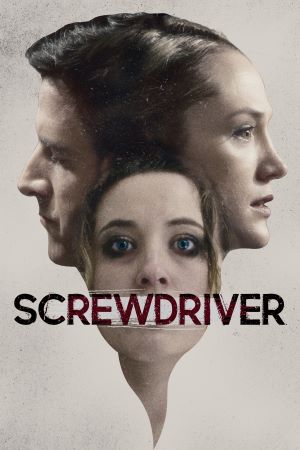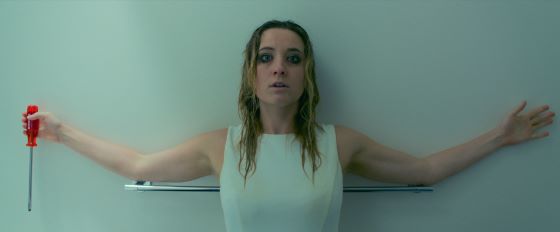

[Rating: Minor Rock Fist Down]
Streaming on Friday, November 10
A one-note premise stifled by uninspired direction, bad plotting, and uneven acting, Screwdriver is what happens when the seed of an interesting idea gets no water, light, or love to grow. Ostensibly a story about exploitation, manipulation, and trauma bonding, the narrative and themes proceed on a line so straight that a twist feels inevitable…right up to the last frame when it fails to materialize.
When the audience meets Emily (AnnaClare Hicks) she has just arrived at the home of an old high school friend, Robert (Charlie Farrell), who has agreed to let her stay in his ultra clean contemporary-modern Los Angeles house. Emily took a train out to L.A. from the Midwest following a split from her longtime partner, and is staying with Robert and his wife, Melissa (Milly Sanders), while she collects herself and regroups. Melissa works for a pharmaceutical company and insists that Emily drink deeply from the homemade juice smoothies provided each morning, at which point both hosts depart and leave Emily alone for the day.
To no one’s surprise except Emily’s she starts experiencing insomnia, hallucinations, and a loss of appetite, which coincide with an alternating series of love bombing and aggression overtures from both Robert and Melissa. The pair take turns being nice and then mean while also initiating a whole lot of touching and veiled intimacy, which, depending on her juice dosage, both delights and frightens Emily. Robert also begins conducting thought and actualization experiments with Emily, deepening her reliance on her hosts which in turn gets her to second-guess what she thinks and knows about her life up to this point.

The story proceeds from here towards a second act reveal about Melissa that takes this all across the finish line. No spoilers here, but the reason for Robert and Melissa’s behavior (along with their ultimate endgame) are made clear in the second act, and while Emily is involved, she has surprisingly little agency considering her role as the lead of the picture. And while there are plenty of interesting scraps of information and questions presented in the first half (the nature of the juice, Emily’s obsession with a former student of Robert’s, Melissa and Robert’s professions), none of it is clarified and tied into the resolution.
It’s not just the story that is flat and unimaginative, though: writer/director Cairo Smith does little with the visual composition of each set piece when framing the action or setting the scene. Most of the movie is made up of conversations between two or three people, and all are shot-reverse shots that just bounce back and forth between characters like a 60 Minutes interview segment. There’s a lack of inserts, close-ups, two-shots, and lighting techniques that would have taken some of the burden off of the actors to sell this, as all struggle to do to varying degrees throughout.
Setting-wise this all takes place in Los Angeles, yet Screwdriver has no real sense of place and never uses its location to any advantage. Emily’s presence in L.A. is meant as a contrast to her Midwest roots, yet nothing about that transposition seems to play any role in her breakdown despite any number of factors that could be brought to bear in this regard (the weather, people, traffic, smog, etc). The script flirts with this a bit when Melissa makes snide remarks about Emily’s clothes, yet this is never incorporated into the wider context of events since the action all takes place in the house.

Less an active participant and more of a scarecrow that the movie props up to maintain the appearance of structure, Emily just kind of goes along with everything. Hicks is given the thankless task of performing as a character with maddeningly unclear motivations from start to finish, as the audience never discovers the truth behind Melissa’s juice dosing, the precise nature of the Midwest breakup, or even what she looked like before the recent trauma (i.e.: how all of this is different). All this leaves is an attempt at suspense over what is happening and what might come next, yet the former is made clear long before it’s made explicit, which in turn makes the latter a foregone conclusion.
Sanders struggles to sell her scenes, though Farrell does good work as the manipulative frenemy who is almost cult-leader-like in his bearing and posture. Screwdriver is successful in exploring the ways predatory individuals feed on emotionally vulnerable people (vis a vis drugs…maybe), yet instead of using this as one plank of a broader story, it is the whole damn thing. All of this combined with the dearth of creativity behind the camera make for a dull viewing experience that no single performance or concept, no matter how good, can save.
A fragment of a good idea burdened by a lack of company, Screwdriver has only one storytelling move and little else to support even that. A narrative with a singular focus on just one plot development suffers from a lead with no agency, acting that runs the gamut from decent to embarrassing, and visual bankruptcy: leaving little to enjoy, here. Although the title of the movie refers to a tool, after watching this one, a person might need the cocktail named after it (undefined drug spiking optional).





Comments on this entry are closed.